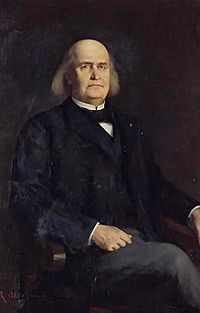Leconte de Lisle facts for kids
Quick facts for kids
Leconte de Lisle
|
|
|---|---|
 |
|
| Born | Charles Marie René Leconte de Lisle 22 October 1818 Saint-Paul, Réunion, France |
| Died | 17 July 1894 (aged 75) Voisins (near Louveciennes), France |
| Occupation | Poet, writer, translator |
| Period | 1846–1894 |
| Literary movement | Parnassian poets |
| Notable works | Poèmes antiques, Poèmes barbares, Poèmes tragiques, A People's history of the French Revolution (Histoire populaire de la révolution française), A People's History of Christianity (Histoire populaire de la christianisme) |
Charles Marie René Leconte de Lisle (born October 22, 1818 – died July 17, 1894) was a famous French poet. He was a key figure in a group of poets called the Parnassian movement. People often just call him Leconte de Lisle.
Contents
About His Life
Leconte de Lisle was born on the island of Réunion, a French island in the Indian Ocean. He spent his early years there and later lived in Brittany, a region in France. One of his childhood friends was a musician named Charles Bénézit.
His father, who was an army surgeon, was very strict. He sent Leconte de Lisle to travel in the East Indies. His father wanted him to have a career in business. However, after his trip, Leconte de Lisle chose to study in Rennes, Brittany. He focused on Greek, Italian, and history. In 1845, he moved to Paris for good.
His Role in Politics
Leconte de Lisle was involved in the French Revolution of 1848. This revolution led to the French king, Louis-Philippe, losing his power. After the Second Republic was created, Leconte de Lisle did not take part in politics anymore.
Later, during the time of Emperor Napoleon III, Leconte de Lisle accepted money and awards from the Emperor. This caused some problems for him after Napoleon III's rule ended in 1871.
However, Leconte de Lisle showed his support for the new government, the Third Republic. He wrote two books that supported democratic ideas. These books were called A People's History of the French Revolution and A People's History of Christianity. Because of these works, he got a job as an Assistant Librarian at the Luxembourg Palace in 1873. In 1886, he was chosen to join the French Academy, taking the place of the famous writer Victor Hugo.
Leconte de Lisle passed away in Voisins, a town near Louveciennes, west of Paris.
His Poetic Style
Leconte de Lisle was a very important leader in the Parnassian poetry movement, which started around 1866. This group of poets wanted poetry to be very precise and beautiful, focusing on art for art's sake. They were a link between the Romantic period and the Symbolist period in French literature.
What He Wrote
Leconte de Lisle wrote many different kinds of works. He is best known for his poetry, but he also wrote plays, translated ancient texts, and wrote historical books.
His Poetry Collections
He is most famous for his three main collections of poems:
- Poèmes antiques (published in 1852)
- Poèmes barbares (published in 1862)
- Poèmes tragiques (published in 1884)
He also wrote other poetry collections, including:
- Poèmes et Poésies (1855)
- Le Chemin de la Croix or La Passion (1856)
- Poèsies Complètes (1858)
- Le Soir d'une Bataille (1871)
- Le Sacre de Paris (1871)
- Derniers poèmes (published after his death in 1895)
His Plays
Leconte de Lisle also wrote plays for the theater:
- Hélène (1852)
- Les Érinnyes (1873) - This was an ancient tragedy.
- L’Apollonide (1888) - This was a lyrical drama with music.
His Translations
He was also known for translating many important works from ancient Greek and Latin into French. He helped French readers enjoy these classic texts. Some of his translations include:
- Works by Theocritus (1861)
- Homer's Iliad (1866) and Odyssey (1868)
- Works by Hesiod (1869)
- Works by Aeschylus (1872)
- Works by Horace (1873)
- Works by Sophocles (1877)
- Works by Euripides (1884)
His Historical Books
Leconte de Lisle also wrote several historical books, often focusing on history for everyday people:
- L'Inde française (1858) - About French India.
- Catéchisme populaire républicain (1870) - A republican catechism for the people.
- A People's History of Christianity (1871)
- A People's History of the French Revolution (1871)
- A People's History of the Middle Ages (1876) - He wrote this with other authors.
See also
 In Spanish: Leconte de Lisle para niños
In Spanish: Leconte de Lisle para niños
 | Frances Mary Albrier |
 | Whitney Young |
 | Muhammad Ali |

